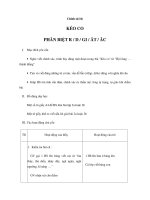Lorna doone R.D. Blackmore
Bạn đang xem bản rút gọn của tài liệu. Xem và tải ngay bản đầy đủ của tài liệu tại đây (7.64 MB, 68 trang )
R.D. BLACKMORE
Lorna Doone
Retold by John Escott
BEGINNER LEVEL
Series Editor: John Milne
The Heinemann ELT Guided Readers provide a choice of enjoyable
reading material for learners of English. The series is published at
five levels - Starter, Beginner, Elementary, Intermediate and Upper.
At Beginner Level, the control of content and language has the
following main features:
Information Control
The stories are written in a fluent and pleasing style with straightfor-
ward plots and a restricted number of main characters. The cultural
background is made explicit through both words and illustrations.
Information which is vital to the story is clearly presented and
repeated where necessary.
Structure Control
Special care is taken with sentence length. Most sentences contain
only one clause, though compound sentences are used occasionally
with the clauses joined by the conjunctions 'and', 'but', and 'or'. The
use of these compound sentences gives the text balance and rhythm.
The use of Past Simple and Past Continuous Tenses is permitted
since these are the basic tenses used in narration and students must
become familiar with these as they continue to extend and develop
their reading ability.
Vocabulary Control
At Beginner Level there is a controlled vocabulary of approximately
600 basic words, so
that students
with a basic knowledge of English
will be able to read with understanding and enjoyment. Help is also
given in the form of vivid illustrations which are closely related to
the text.
For further information on the full selection of Readers at all five
levels in the series, please refer to the Readers catalogue.
A Note About the Author
A Note About This Story
The People in This Story
1 My Story Begins
2 The Doones
3 Lorna
4 The Sign
5 The Message
6 Snow on the Moor
7 The Fight at the Farm
8 The Truth About Lorna
9 Torna Has Forgotten Me !'
10 After the Battle
11 At Lord Brandir's House
12 We Attack the Doones
13 Lorna Comes Home
4
5
6
7
11
14
20
26
30
34
39
42
46
50
57
60
R.D. (Richard Dodderidge)
Blackmore was born in
Berkshire, England, on 7th
June, 1825. His mother died
a few months later.
In 1832, his father took
Richard to the county of
Devon, in the south-west of
England. He lived there until
1843. He studied at a school
in Tiverton. After that, he studied at Oxford University.
In 1852, Blackmore became a lawyer in London,
and the next year he married Lucy Macguire.
Blackmore was not strong and he did not work as a
lawyer for very long. He became a teacher. In 1857,
Blackmore's uncle died and his money came to
Richard. After that, Richard did not teach any more.
He lived with his wife in a large house near London,
and he wrote poems and novels. Lucy Blackmore died
in 1888, and Richard died on 20th January, 1900. The
Blackmores had no children.
R.D. Blackmore wrote fifteen novels. Some of these
stories are: Clara Vaughan (1864), Craddock Newell
(1866), The Maid of Sker (1872) and Christowell
(1882). His most famous story was Lorna Doone (1869).
It has become one of the most popular stories in
English. There are many films of this story.
4
Time: 1673 to 1686. Place: Exmoor, in the south-west
of England.
In the seventeenth century, most people in Britain
lived in small villages. Towns and cities were small.
The roads between them were bad. Journeys from the
south-west of England to London were long and
difficult. Travellers had to ride in coaches, or ride on
horses, for several days.
There was a lot of trouble in Britain in the 1680s.
Most people in the country liked King Charles II. But
he died in 1685 and his brother, James, became the
new king. King James II was not popular. Many powerful
people in Britain wanted a different king. James Scott,
Duke of Monmouth, tried to become king. His friends
fought several battles with the soldiers of King James.
These battles are now called the Monmouth
Rebellion. The King's soldiers beat Monmouth's men.
They caught the Duke of Monmouth and they killed
him. The king sent a judge - George Jeffreys - to the
south-west of England. Judge Jeffreys was a clever and
powerful man. He killed all of Monmouth's friends.
Some of this story happens at the time of the
Monmouth Rebellion. In the story, John Ridd is for King
James, but John's cousin, Tom Faggus, is
against the King.
5
My name is John Ridd and I am a farmer. I live in the
village of Oare, in the county of Somerset. Oare is on
Exmoor - a wild part of Somerset. The Ridds have
been farmers here for hundreds of years.
My story begins in the town of Tiverton, in
November, 1673. I was twelve years old then, and I
was living at my school. I lived at the school for most
of the year, but I went home for the holidays.
It was five o'clock on the afternoon of the 29th
November. There were no more lessons that day. I was
standing by the school door. Suddenly, I saw Jan Fry.
Jan worked on our farm at Oare. But that afternoon, he
was waiting outside the school gates. He was sitting on
his horse. And my horse was standing beside his horse.
'Why are you here today, Jan?' I asked him. The
school holiday will begin in two weeks' time.'
Tes, I know that, Master John,' he said quietly. 'But
you must come home tomorrow. I will stay here
tonight. We will start our journey in the morning.'
'But why have you come for me, Jan?' I asked him.
'My father always takes me home from school at the
beginning of the holiday. Why isn't father here?'
Jan did not look at me.
'He's - He's very busy today,' he replied.
But I did not believe him.
The journey from Tiverton to Oare was difficult and
long. At noon, we stopped at the town of Dulverton.
We had a meal there and our horses rested for an hour.
Then we continued our journey.
Outside Dulverton, we saw a fine coach. Four horses
were pulling it and three people were sitting inside it.
One of these people was a woman with black hair and
dark eyes. Next to her sat a pretty little girl with long
dark hair. The third person in the coach was a lady - a
very beautiful lady. She was wearing fine clothes.
'Who are those people?' I asked myself. 'Is the
black-haired woman a servant? And is the pretty little
girl the beautiful lady's daughter?'
In the afternoon, thick fog came down. We could
not see the road clearly.
Everything was silent.
But Jan
and I rode on across the moor.
After some time, Jan spoke.
8
'We must be very quiet now, Master John,' he said.
And I knew the reason for this. We were near our
home. But we were also near Doone Valley.
The Doones were terrible people! They were a family
of robbers and murderers. They lived in a lonely valley
on Exmoor. And their valley was a dangerous place!
After a few minutes, Jan spoke again.
Suddenly, the fog went away.
9
One rider was holding a child - a little girl. She was
wearing a fine dress. I could not see her face. But she
was unhappy. She was crying.
Suddenly, I was angry. I stood up and I shouted at
the riders. Two of the men turned and looked at me.
One of them pointed his gun at me. But the other man
put his hand on his friend's arm. And after a moment,
the men rode on.
'You were very foolish, Master John,' Jan said. 'The
Doones are dangerous men!'
We rode on to our farm. We got off our horses. But my
father did not come out of the house. Then I heard my
mother crying. And then I knew everything. My father
was dead!
10
The Doones had murdered my father. That evening,
Jan Fry told me about it.
Father had been returning to Oare from Porlock,
with six other farmers. Early in the morning, they were
riding through a forest. Suddenly, a man rode out of
the trees. He was one of the Doones.
'Give me all your money!' the man said to the farm-
ers.
The other farmers were afraid of the Doones. They
quickly gave the man their money. But Father was not
afraid. He rode his horse towards the man and he lifted
his stick. At that moment, there was a shout, and
twelve more Doones rode out of the trees.
My father was a brave man and he tried to fight the
Doones. But one of them - Carver Doone - had a gun.
He shot my father and killed him.
After my father's funeral, my mother went to Doone
Valley. There was a high wall at the end of the valley.
And there was a gate in the wall - the Doone Gate.
Two men always guarded the gate. My mother spoke to
the guards.
Take me to Sir Ensor Doone,' she said.
One of the guards took my mother to Sir Ensor's
house in the valley.
11
Sir Ensor Doone was the head of the Doone family.
He was a very old man.
'Why have you come here, Mrs Ridd?' Sir Ensor
asked my mother.
'One of your men killed my husband,' my mother
replied. 'Do you know about this?'
'My men are sometimes wild,' Sir Ensor said. 'But
they don't kill people. I don't believe your story.'
The old man went to the door of the house, and he
shouted to someone. After a minute, another person
came in. He was a grey-haired man with a long beard.
'Listen to this woman's story,' Sir Ensor said.
Mother told the story again.
'That story is not true,' said the grey-haired man.
'Four of our young men went to Porlock that day -
only four! Some farmers attacked them in the forest.
One of the farmers - a big, strong man - knocked three
of our men to the ground. He was going to kill them!
Then Carver used his gun. He had to kill the farmer.'
12
Sir Ensor Doone believed the man's story. My mother
returned home sadly.
After my father's death, I did not go back to school.
I lived on the farm with my mother and my sister,
Annie. But I took my father's gun and I used it every
day. After a few weeks, I could shoot well.
Everybody was frightened of the Doones. Carver
Doone had killed my father, but nobody had punished
him.
'One day, I will kill him,' I said to myself.
Many years later, I heard more about the Doones.
Sir Ensor Doone had come to Exmoor from Scotland
in 1640. Before that, Sir Ensor and his cousin, Lord
Dugal, had owned a lot of land in Scotland. But the
two men were not friends. They argued about the land.
They went to the law courts in London. There was a
trial, and Sir Ensor lost all his land.
After the trial, Sir Ensor and his family came to
Exmoor. They built their houses in a lonely valley.
At first, there were only twelve Doones. And at first,
the farmers of Exmoor were their friends. The farmers
took them food. They tried to help the family. But soon,
Sir Ensor's sons grew big and strong. Then
they began to
steal
from the farmers. They stole their animals. And
sometimes they stole the farmers' daughters too. They
took the girls and married them.
Soon, everybody on Exmoor hated the Doones!
13
In February 1676, I was fourteen years old. And one
sunny February afternoon, I went fishing.
The Lynn River passed near our farm. And two miles
from the farm, Bagworthy Water and the Lynn River
joined together. That was a good place for fishing. I
often caught loach there. Loach are small, delicious
fish. We all liked to eat them.
That February afternoon, I went to my fishing-place
and I sat on the river bank. But I was not lucky. After
two hours, I had not caught any fish.
I got up, and I began to walk along the bank of the
Lynn River. I was walking towards Doone Valley. After
a mile, the banks of the river were very steep. Then I
had to walk in the water. The water was very cold
under the dark trees. But soon, I caught a few loach.
After that, I walked on again, along the river.
After another mile, I came to a large pool in the
river. On one side of the pool there was a high rock. A
stream of clear water fell from the top of the rock down
into the pool. And suddenly, I wanted to climb to the
top of that rock!
I started climbing. The rock was steep and wet.
Once, I fell back into the deep pool. I had to start
climbing again.
At last, I got to the top of the rock,
and I was in a beautiful green valley. But I had injured
14
my foot and I was very tired. I lay on the grass and I
shut my eyes.
When I opened my eyes again, I saw a young girl
beside me. She was about eight years old.
'What's your name?' she asked. 'How did you get
into the valley?' She had a sweet voice, and beautiful
dark eyes and dark hair.
'My name is John Ridd,' I replied. 'I've been fishing
in the river.'
'Oh, you've injured your foot!' the girl said. 'It's
bleeding. I'll tie some cloth round it.'
'It's all right,' I said. 'Please don't worry about my
foot. But please tell me your name.'
'My name is Lorna - Lorna Doone,' she replied.
'Didn't you know that?' Suddenly, the girl's voice was
unhappy. Then she began to cry.
15
I wanted to kiss her. After a moment, I did kiss her.
The beautiful little girl stopped crying.
The Doones must not find you here,' she said. You
must go. One of the men will see you. Then they'll kill
both of us!'
They'll kill us? Why, Lorna?' I asked.
This is the Doones' valley,' she said. 'And now
you've found one of the secret entrances.'
Then she smiled.
'I like you, John Ridd,' she said. 'Go now. Come
here again one day. But please, be careful!'
'I like you, Lorna,' I said. 'I like you as much as my
sister, Annie.'
Suddenly, we heard somebody shouting. Lorna's face
became pale.
'The men are looking for me, John!' she said. 'You
must go. But you can't climb back down the rock.'
Then she pointed to a place on the side of the valley.
'Do you see that hole in the rocks, over there?' she
said. 'You can get out of the valley through that hole.
Goodbye, John!'
I hid behind some trees. Lorna lay down on the
grass, and she closed her eyes. Soon, twelve men came
down the valley towards her.
'Carver! Here's our little girl!' one of the men
shouted. 'She's asleep on the grass!'
Carver Doone walked up to Lorna. He was a big
man. He lifted the beautiful little girl in his arms, and
he carried her
away.
16
After a few minutes, I ran to the hole in the rocks. I
climbed through it. Then I ran all the way to my home.
Seven years passed. I grew bigger and stronger than any
man on Exmoor. I often thought about Lorna, but I did
not go to Doone Valley.
I worked hard every day. I did not leave the farm
very often. But we often had visitors at our house.
Sometimes, Tom Faggus visited us. Tom was my
mother's cousin. I liked him very much.
Tom was a good man. He had been a farmer once,
but some rich men had taken his farm from him. After
that, he became a robber. He became a highwayman.
He stopped people on the roads and he took their
money. He took their money, but he never hurt them.
And he gave most of the money to poor people.
17
Tom visited us every month. My sister, Annie,
watched him carefully, and she listened to all of his
stories. Tom fell in love with her, and she fell in love
with him.
One day - it was New Year's Day, 1683 - Tom and I
were riding on the hills together. Suddenly, Tom
stopped his horse.
'Look down there, John!' he said.
In a moment, we were both looking through a hole
in the rocks. We were looking down into Doone Valley!
I started to think about Lorna. I remembered her soft
voice and her sweet smile. I remembered her beautiful
dark eyes. And I remembered her sadness.
Then Tom was speaking to me, but I wasn't listening.
I had seen something in the valley. Something white
was moving quickly along the valley. It was Lorna!
18
That spring, I dreamt about Lorna often. And one day,
I walked along the river to the high rock by the pool. I
was a tall, strong young man. This time, I climbed to
the top of the rock easily. In the green valley, birds
were singing. I lay down and I closed my eyes. The
grass was soft under my head.
I heard Lorna's sweet voice a few minutes later. She
was coming towards me and she was singing. She
stopped near me, and I opened my eyes.
There were flowers in Lorna's hair. She was very
beautiful!
'Lorna Doone!' I said.
She remembered me - I knew that. But she smiled
and she asked me a strange question.
'How do you know my name?' she asked.
'I'm John Ridd,' I replied. 'We met here seven years
ago. You were very kind to me. Don't you remember?'
'Yes! I remember,' Lorna said. 'But don't you
remember something, John Ridd? This is a dangerous
place for you.'
Lorna was afraid. I looked at her big, dark eyes. And
suddenly, I loved her. I loved her very much! At last I
spoke.
'Yes, it's a dangerous place for me,' I said. 'And you
are afraid. Please, don't be afraid, Lorna. I'll go now.
But I will come back another day.'
Lorna smiled and I touched
her white hand. Then
we said goodbye.
19
Two weeks later, I saw Lorna again. I went into the
valley, and she took me to a secret cave near the pool.
She told me more about herself.
'Only two people talk to me,' she said. 'One is my
grandfather, Sir Ensor Doone. The other is my servant,
Gwenny. My father was Sir Ensor's eldest son. But I
don't remember my mother or my father.'
'I'm not happy here, John,' said Lorna. 'The valley
is beautiful. And Sir Ensor often says, "One day, this
valley will belong to you." But I don't want to live with
the Doones. All around me are robbers and murderers.
I often come to this cave. I can be alone here.'
'Carver wants to marry me, John,' Lorna said. 'He's
strong and brave. But he's a cruel man!'
She began to cry.
'You must go now, John,' she said. 'But I want to see
you again soon. Please make me a promise. Come to
the valley often. Try to come every day. Sometimes, I'll
put a black coat over the white stone outside the cave.
You'll see the coat from the hill above the valley. Then
you must come to the cave. I'll be waiting for you. The
coat will be our secret sign.'
I was very busy during the next two weeks. I worked
very hard on the farm.
Each day, I went
to the hill above
Doone Valley. And each day, I looked for Lorna's sign.
20
But I did n o t see it.
After two weeks, I had a visitor. One afternoon, a
man rode up to the farm. He got off his horse.
I'm looking for John Ridd,' he said to me.
'You've found him,' I replied. 'I'm John Ridd.'
'My name is Jeremy Stickles,' the man said. 'I'm one
of the King's messengers. You must come with me to
London, Mr Ridd.'
21
The messenger gave me a letter. I opened it and I
read it quickly. The letter was an order from one of the
King's judges. I had to go to London. I had to tell the
King's judge about the Doones.
I was not happy about this. I did not want to leave
my mother and sister at the farm. But I had to go. I
asked Jan Fry to take care of the farm.
It was a long and dangerous journey to London.
Jeremy Stickles and I travelled for many days. But
Jeremy told me many stories. Soon, we were good
friends. At last, we arrived in London.
I was going to talk to Judge Jeffreys. But the judge
was a very busy man. I had to wait in London for two
months. And I did not like the city.
At last, the judge sent for me. I went to his house.
'Who are you?' Judge Jeffreys asked me.
I'm John Ridd, sir,' I replied. 'I came from Exmoor
two months ago. I came with Jeremy Stickles, the
King's messenger.'
22
'You've come from Exmoor. Yes!' said Judge Jeffreys.
'Your neighbours are a family of robbers. Am I right?'
'Yes, sir,' I said. 'My neighbours are the Doones.
They are robbers and murderers! There are about forty
of them.'
'Forty! Why aren't these Doones in prison?' asked
Judge Jeffreys. 'Is the judge in Tiverton also a Doone?'
I was surprised by this question and I did not reply.
'No,' said Judge Jeffreys. 'The judge in Tiverton is
not a Doone. I can see the answer in your face. Now,
John Ridd, tell me another thing. Do you know any
highwaymen? Do you know Tom Faggus?'
'Yes, sir,' I replied. 'Tom is my cousin.'
The judge smiled.
'Faggus is a good man,' he said. 'He has made mis-
takes, but he loves King Charles. John Ridd, do you
and your friends love the King?'
'We don't know much about him, sir,' I said. 'But we
want him to be a good king.'
'Have you heard about any enemies of the King in
Somerset, John?' asked Judge Jeffreys.
'No, sir,' I replied. Again I was surprised.
'I like you, John Ridd,' said the judge. 'You are an
honest man. Stay away from the King's
enemies. And
s
tay away from the Doones. I'll send someone to
Exmoor soon. He will tell me about the King's enemies
there. And he will find out more about the Doones.
Then we will put them in prison. Now go home, John.'
23









